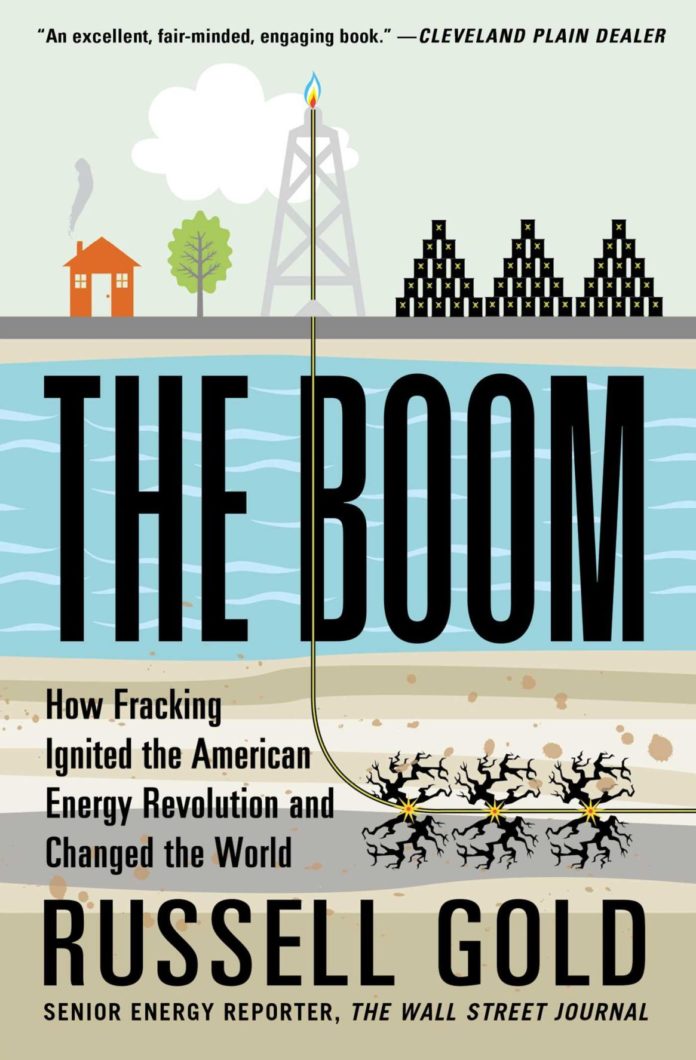The Boom: How Fracking Ignited the American Energy Revolution and Changed the World by Russell Gold. Trade Paperback $17.00 Simon & Schuster – See more at: http://books.simonandschuster.biz/
The current downturn in oil and gas prices may linger for longer than the previous one in the 1980s.
That’s the view of Russell Gold, senior energy editor of The Wall Street Journal and author of The Boom a recent book about how technology developed in the Barnett Shale has fueled energy – and political – changes around the world.
“The reason is the easy access to capital today,” Gold told an audience at TCU on Monday night. He was speaking as part of the Kenneth Davis Jr. Energy Speakers Series at the Dee J. Kelly Alumni Center at the school. “Think about it, in the late ‘70s and ‘80s the cost of capital was much higher.”
Gold cited Rex Tillerson, Exxon Mobil chairman and CEO, speaking in the Petroleum Intelligence Weekly, who said that critical difference – easy access to capital in today’s global financial environment – from the previous downturn may delay recovery.
While the downturn is a threat to the energy industry, Gold also said the biggest threat is the large group of people who want to move away from all fossil fuels.
Gold showed a slide that showed protesters in kayaks in Seattle surrounding a Royal Dutch Shell drilling rig headed to Alaska. Gold noted that they were protesting the drilling by rowing up in plastic kayaks made by fossil fuels.
“There’s a big disconnect,” he said.
“On one hand, you have fracking, which has done an amazing job to provide new energy at an affordable price,” he said. But, he said, when fracking became more urban and people did not feel the industry was listening to them, “then you have Denton,” referring to the city’s vote to ban drilling.
While the modern era of fracking began in and around Fort Worth, the concept of fracking dates back the Civil War, Gold said. Col. Edward Roberts took note of an underwater explosion during the battle of Fredericksburg. From his book: “He noticed that some of the shells landed in a small canal and detonated underwater. The weight of the water tamped down the explosion, forcing the energy sideways in the earthen walls of the canal.”
Roberts applied that idea to Pennsylvania’s new oil wells and eventually patented an idea for what he called a “torpedo.”
As a side note, many drillers who used Roberts’ idea without paying a royalty did so at night and were called, “moonlighters.” “That’s where we got the term,” Gold said.
Ironically, Texas put its own damper on fracking’s early days. Who needs to frack a well when you’ve got a gusher like Spindletop, that popped in 1901?
But George Mitchell of Mitchell Energy began looking at fracking again in the Barnett Shale, where he had secured leases in Wise County. He tried for several years without much success to find the right combination to release natural gas from the shale.
In 1998, Mitchell Energy finally saw some success when it fracked the S.H. Griffin Estate No. 4 well near Justin. The Barnett Shale was off and running, pumping natural gas and eventually, Gold says, changing the world.
But even then, Gold said, there were two big misconceptions about the process. “[Experts] thought the Barnett Shale was unique and success couldn’t be duplicated” in other shales, he said.
That has been proven untrue with the success of the Eagle Ford Shale in South Texas and the Bakken Shale in North Dakota.
“All of these shales use a slightly different formula, but it’s been very successful,” he said.
Experts also said the same fracking techniques used in the Barnett would not be applicable to oil, a heavier molecule.
That, too, has proven untrue, said Gold
After years of thinking the U.S. would be dependent on others for oil and natural gas, now the reverse if true, Gold said.
“We’re talking about exporting oil and gas now,” he said.
That, he said, has had geopolitical implications as well. It has also helped lead to a downturn in oil and gas prices that has put a damper on the very industry that has been productive over the past few decades.






